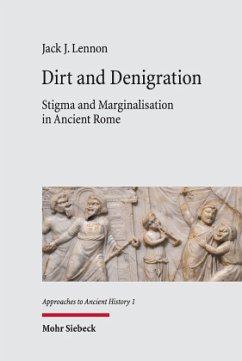Jack J. Lennon examines those groups in ancient Rome that were most frequently attacked using the language of dirtiness and contamination, whether because of their profession, ethnicity, or social position. Focusing on those that commonly laboured under the stigma of impurity, he considers the significance of denigration in Roman society, which he defines as attacks against individuals based specifically on their alleged dirtiness. The author demonstrates the importance of dirtiness as a mechanism within the wider processes of social and political interactions and marginalisation. In so doing he goes beyond the existing discussions of who was labelled unclean in ancient Rome to reveal how the supposed dirtiness of an individual or group was articulated to the rest of society and perpetuated over time. Furthermore, he considers how this form of stigma affected those who attracted allegations of dirtiness. The study of dirt and its role within social interactions offers an excellent lens through which to study Roman society's constantly evolving perceptions of itself and of those peoples or activities that were thought to require censure or control. Jack J. Lennon combines the more traditional elements of ancient history with research models and theories developed across the fields of anthropology, psychology, and medieval history, each of which has provided significant advances for the study of stigma and marginalisation. By exploring the subject of dirt and its impact on social status in ancient Rome, the author provides a new avenue of approach for the study of marginal groups and the process of marginalisation within Roman society.
Bitte wählen Sie Ihr Anliegen aus.
Rechnungen
Retourenschein anfordern
Bestellstatus
Storno








